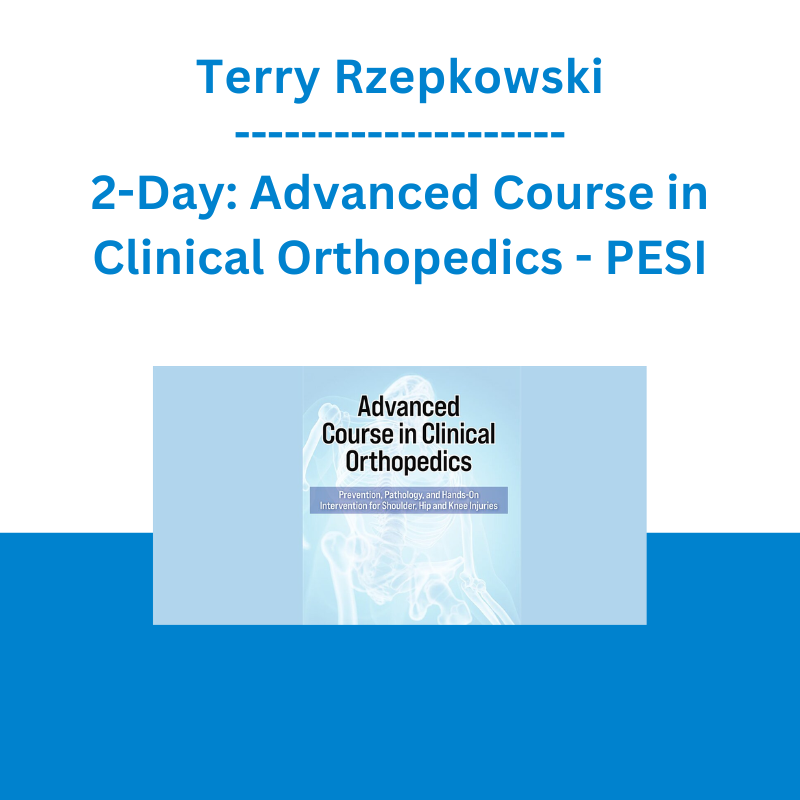*** Proof of Product ***
Exploring the Essential Features of “Terry Rzepkowski – 2-Day: Advanced Course in Clinical Orthopedics: Prevention, Pathology, and Hands-On Intervention for Shoulder, Hip and Knee Injuries – PESI”
Speaker: Terry Rzepkowski, DPT, MS, BS
Duration: 13 Hours 07 Minutes
Format: Audio and Video
Copyright: Oct 04, 2021
Media Type: Digital Seminar
Description
Orthopedics is an incredibly fast-moving specialty. Technological advancements are dramatically adding to the vast options available for a wide variety of orthopedic problems — making it challenging to stay current…
It’s imperative that your treatment decisions are guided by the latest research-based information. This comprehensive online course makes it easy for you to ensure the best outcomes for your patients.
Watch orthopedic expert, Terry Rzepkowski, DPT, as he shares cutting edge concepts that are being integrated into practice today and learn the latest clinical evidence that should be guiding your treatment decisions. You’ll gain practical new insights and discover the latest treatment updates for this specialized patient population:
- Techniques to minimize the impact of degenerative joint disease in both inpatient and outpatient settings
- How to differentiate the type of joint damage that has taken place
- Strategies to avoid orthopedic complications
- Video demonstrations of actual joint surgical procedures
- Total joint replacement rehabilitation strategies for the shoulder, elbow, hip, and knee.
- Functional strategies to manage post-op rehab
- And much more!
Return to work with new ideas, new tests you can use to identify orthopedic problems correctly, and new concepts to make certain the rehabilitation plan chosen is specific to your individual patients. Master joint rehabilitation techniques, increase your credibility, grow your career potential — And most importantly, improve your patients’ treatment outcomes.
Speaker
Terry Rzepkowski, DPT, MS, BS
Terry L. Rzepkowski, DPT, MS, BS, (AKA Dr. Z) is a Doctor of Physical Therapy with specialization in Orthopedic Physical Therapy. Throughout his 40-year career, he has specialized in orthopedics, specifically: musculoskeletal outpatient rehab as an independent private practitioner, total joint replacement surgery, sports medicine, and orthopedic homecare. This extensive background allows him to relate his knowledge of the complex rehab patient from prevention strategies including rehabilitative exercises, lifestyle and activity modifications through all phases of post-op rehabilitation.
Speaker Diclosures:
Financial: Terry Rzepkowski has employment relationships with PTCE, Presbyterian College, Nova Southeastern University, National Healthcare Licensing Solutions, Inc., and Varsity Tutors. He receives compensation as a national presenter. Terry Rzepkowski receives a speaking honorarium and recording royalties from PESI, Inc. He has no relevant financial relationships with ineligible organizations.
Non-financial: Terry Rzepkowski is a member of the APTA.
Objectives
- Evaluate the anatomy and biomechanics of the shoulder, hip, and knee.
- Perform assessment techniques to identify predisposing factors to injury of the shoulder, hip and knee.
- Develop a personalized risk-specific treatment approach to minimize functional injury predisposition.
- Perform hands-on clinical assessments to identify structural pathology of the shoulder, hip, and knee.
- Evaluate the key factors in determining the decision for a total or reverse total shoulder.
- Articulate the role of 3D modeling for implants of the shoulder.
- Assess advanced tissue sparing procedures for hip replacement.
- Determine prognosis, treatment duration, and outcome for each type of orthopedic surgical procedure of the shoulder, hip, and knee.
- Analyze advanced pain management strategies in the post-operative patient.
- Assess neuromuscular risk factors leading to LE joint stress.
- Perform hand-on functional rehab techniques for the shoulder, hip, and knee.
- Design functional home exercise programs in appropriate staged progression for the shoulder, hip, and knee patient.
- Evaluate the role of advanced plyometric training for the athlete in performance improvement and reduction of injury risk factors.
Outline
Day 1 – Shoulder
EXAM LAB: ANATOMY & BIOMECHANICS
- Postural positioning of the head and scapula
- Impingement exams:
- Neer
- Hawkins/Kennedy
- Crossover
- Ergonomic accommodations to decrease impingement.
- Surgical interventions
CLINICAL DIAGNOSIS LAB
- Correlate mechanism of injury common exams and surgical interventions for
- RTC
- Glenoid labrum
- Biceps LH
- Gleno-humeral dislocation
PAIN MANAGEMENT, MEDICAL DIAGNOSES, AND SURGICAL INTERVENTION
- Comparative normal versus diagnostic imaging (X-ray, MRI)
- Shoulder Fx
- Total Shoulder replacement anatomical and reverse
- Interscalene nerve block, Exparel perioperative pain management
INJURY PREVENTION AND DEVELOPING A JOINT-SPECIFIC TREATMENT PLAN LAB
- Establish proximal scapular stability progress to distal mobility.
- Progression:
- Flexibility considerations
- Manual scapular stabilization exercises
- RTC manual exercise with scapular integration
- Dynamic distal stabilization exercises
- Home exercise with exercise bands
Day 2 – Hip & Knee
INJURY PREVENTION EXAM LAB
- Posture of the pelvis sagittal/frontal plane
- Predisposing elements that lead to injury
- Glut medius weakness
- IT band test (Ober’s)
- Hip flexor (Thomas)
- Hamstrings (SLR)
CLINICAL DIAGNOSIS LAB- HIP
- Correlate mechanism of injury
- Tissue exam
- Hip Scour
- Impingement sign
- Labral tests
CLINICAL DIAGNOSIS LAB- KNEE
- Dynamic positioning in movement
- Dynamic Valgus
- Ligament dominance
- Quad dominance
- Leg dominance
- Ankle position/ Footwear
- Correlate mechanism of injury
- Tissue exam
- Ligament Medial-Lateral
- Ligament Anterior-Posterior
- Meniscal damage
PAIN MANAGEMENT, MEDICAL DIAGNOSES, AND SURGICAL INTERVENTION
- Hip
- Comparative normal versus diagnostic imaging (X-ray, MRI)
- Acetabular labral defects
- Hip fracture
- Total Hip replacement (Approaches: Posterior, Lateral, Anterior)
- Super Path Hip
- Femoral Nerve Block
- Knee
- Comparative normal versus diagnostic imaging (X-ray, MRI)
- Meniscal Injury (Meniscectomy vs, repair)
- Osteochondral defect
- ACL repair (Hamstring vs Patellar Tendon)
- Total Knee replacement (Traditional, Subvastus, Bipolar, Unipolar, Custom fit)
- Obturator nerve block
INJURY PREVENTION AND DEVELOPING A JOINT-SPECIFIC TREATMENT PLAN LAB
- Hip – Balance weakness and flexibility
- Flexibility considerations
- Proximal closed chain stability exercises
- Hip and core exercises
- Home exercises for dynamic functional integration
- Knee – Incorporate Neuromuscular (N-M) retraining
- Flexibility considerations
- Functional closed chain exercises
- Address ligament/muscular dominance
- Sensory integration in balance progression
- N-M integration in jump mechanics
- Home exercises for dynamic functional integration
- Advanced plyometric training for the LE
Target Audience
- Physical Therapists
- Physical Therapy Assistants
- Chiropractors
- Athletic Trainers
- Occupational Therapists
- Occupational Therapy Assistants
- Exercise Physiologists
- Certified Strength and Conditioning Coaches
- Orthopedic Nurses
- Other Rehabilitation Professionals
Please see the full list of alternative group-buy courses available here: https://lunacourse.com/shop/










 Dave Landry - Stock Selection Course
Dave Landry - Stock Selection Course  Ed Ponsi - Forex Trading
Ed Ponsi - Forex Trading  Michael Hall - The Spirit Of NLP
Michael Hall - The Spirit Of NLP  Fred Haug - Virtual Wholesaling Simplified
Fred Haug - Virtual Wholesaling Simplified